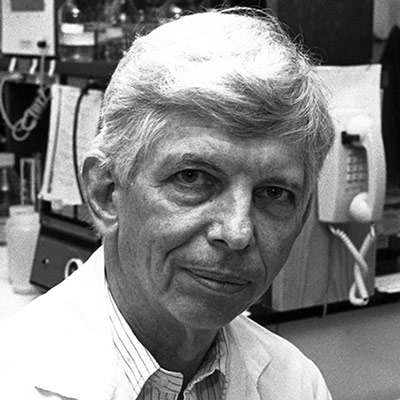

Alfred G. Knudson Jr., the creator of the “two-hit hypothesis,” and a director of the Institute for Cancer Research at Fox Chase Cancer Center, died July 10. He was 93.
The two-hit hypothesis postulates that cancer is produced by accumulated mutations in a cell’s DNA. The hypothesis explains the relationship between the hereditary and non-hereditary forms of cancer, and predicted the existence of tumor-suppressor genes that can suppress cancer cell growth.
In children born with two normal copies of a gene, both copies of said gene would need to be damaged for these children to develop cancer. These children would have non-hereditary cancer.
Subsequently, he mapped the retinoblastoma susceptibility gene to chromosome band 13q14, laying the foundation for cloning of the first tumor-suppressor gene RB1.
Knudson worked at Fox Chase Cancer Center in various roles during the 1970s and 80s. He served as director of the Institute for Cancer Research from 1976 to 1982.
Born on Aug. 9, 1922, in Los Angeles, Kundson received a Bachelor of Science degree from the California Institute of Technology in 1944, his M.D. from Columbia University in 1947, and a doctor of philosophy degree from CIT in 1956. Additionally, he was a Guggenheim Fellow from 1953 to 1954.
In 1988, he received the Charles S. Mott Prize from the General Motors Cancer Research Foundation. In 1989, he received the Medal of Honor from the American Cancer Society.
In 1990, he received the Janeway Medal from the American Radium Society and the Founders’ Award of the Chemical Industry Institute for Toxicology. In 1991, he received the William Allen Memorial Award from the American Society for Human Genetics. In 1992, he was elected member to the National Academy of Sciences.
In 1995, he received the Bertner Award from MD Anderson Cancer Center and the Charles Rodophe Brupbacher Foundation Award. In 1996, he received the Robert J. and Claire Pasarow Foundation Award and the Durham City of Medicine Award.
In 1997, he received the Gairdner Foundation International Award and the David A. Karnofsky Memorial Award from the American Society of Clinical Oncology. In 1998, he received the Albert Lasker Award for Clinical Medical Research. In 1999, he received the Distinguished Career Award from the American Society of Pediatric Hematology/Oncology and the John Scott Award from the City of Philadelphia.
In 2002, he received the Fox Chase Cancer Center’s 14th annual Wick R. Williams Memorial Award and the ASCO 2002 Special Award and Pediatric Oncology Lectureship. In 2004, he received the Kyoto Prize for Basic Science. Additionally, for the first time in history for any journal, Genes, Chromosomes, and Cancer devoted an entire issue to Knudson, and he was the Guest of Honor: XI at the International Congress of Ocular Oncology in Hyderabad, India. In 2005, he received the Bristol-Myers Squibb Freedom to Discover Award for Distinguished Achievement in Cancer Research as well as the AACR Lifetime Achievement Award. In 2013, he became an Inaugural Fellow of the AACR Academy.











